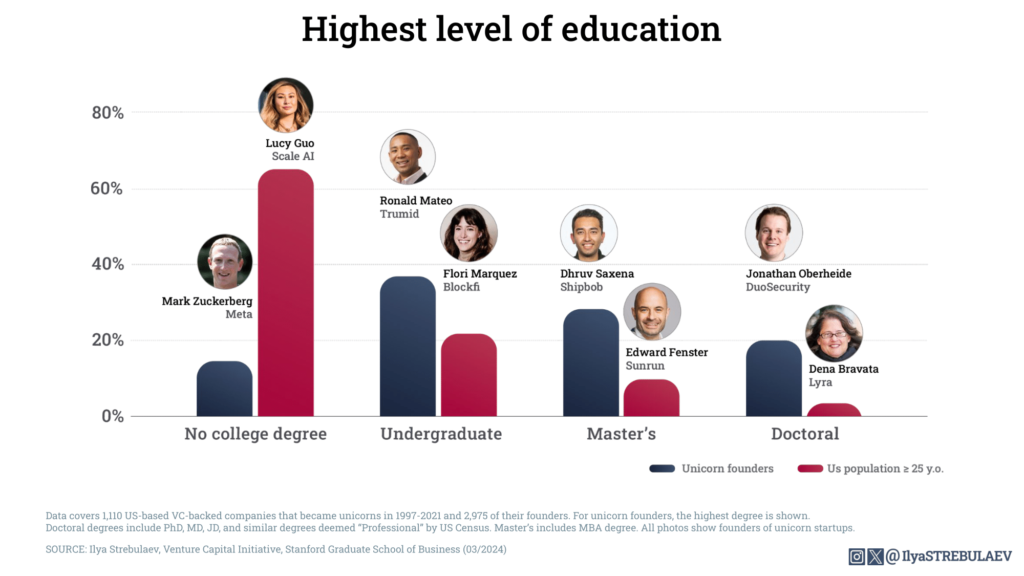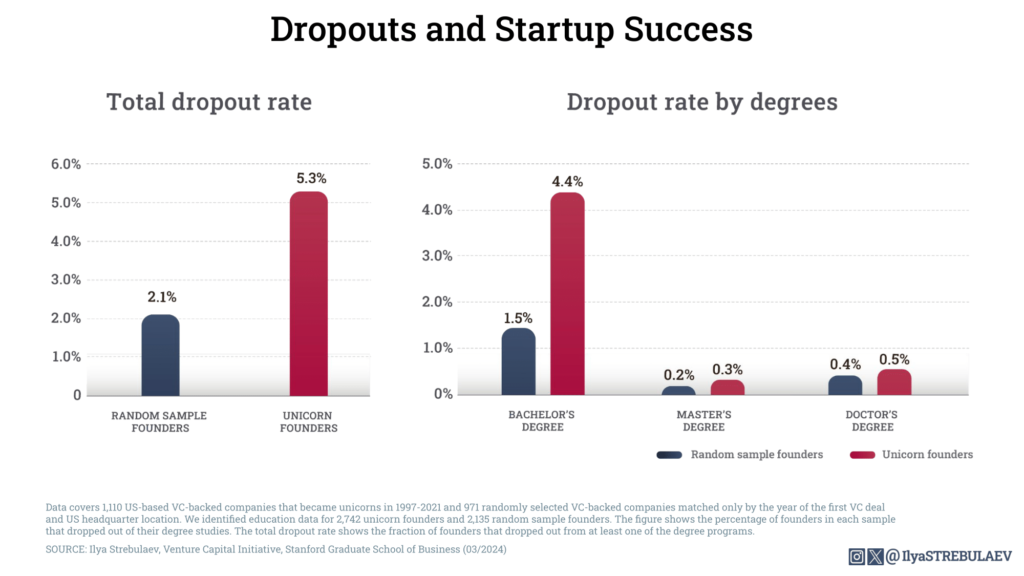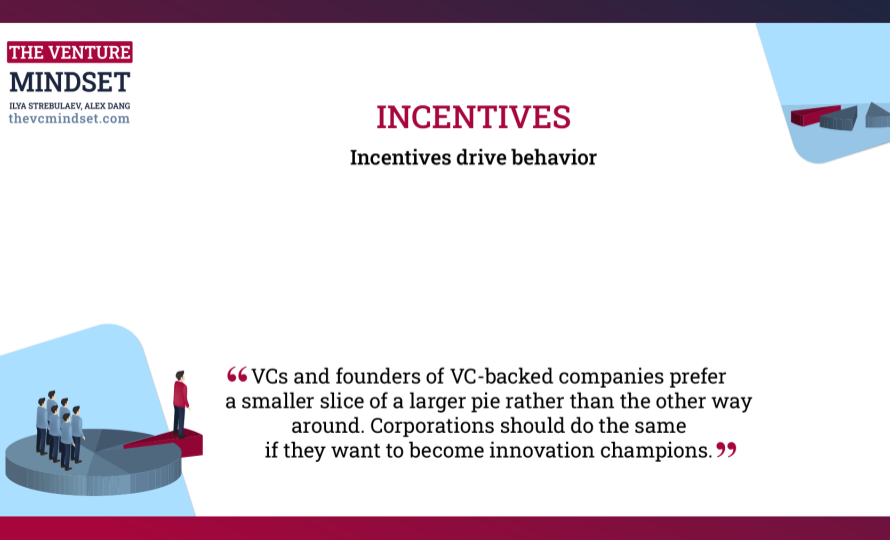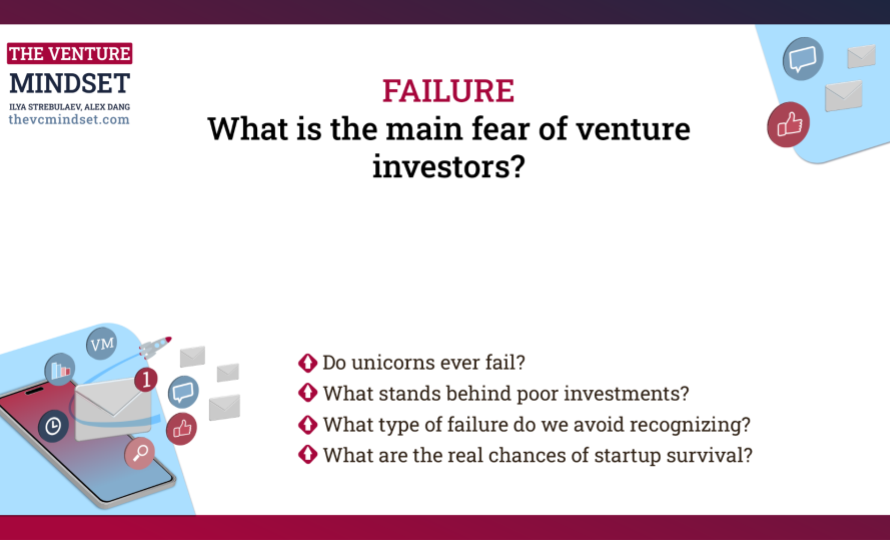Is education overrated? With college dropouts leading billion-dollar giants, this is a hot question among students and parents alike. What’s the best path to venture capital and unicorn success? We can’t unpack this in one go, so consider this newsletter a kickoff to a deep dive on the matter.
EDUCATION
If you think education is a straight line from A to Z that ends with a diploma, it is time to think again. That path might not set you up for success over the next 50 years, especially not in innovation-driven fields. A better approach? Think like a VC. VCs dive into new sectors with relentless curiosity. They constantly learn and prepare their mind. They live by the mantra “you don’t know what you don’t know,” valuing the pursuit of knowledge and new insights over perfection and predefined paths.
Receive The Venture Mindset newsletter first. Subscribe now
1. Quote of the Day

Venture investors operate in a “see and learn” mode. They never claim they have a crystal ball to predict the future. Ask a VC what’s coming next in any sector, and you won’t get a direct forecast. Instead, they’ll highlight a roster of really promising startups and ideas that fuel their enthusiasm. They are not know-it-alls; instead, they are learn-it-alls.
In the realm of innovation and uncertainty, it’s smarter to map the terrain as you go. Every meeting with an entrepreneur is a lesson, every demo offers insights into customer needs and challenges, and every pitch deck enhances VCs’ prepared mind. It’s about embracing perpetual learning!
2. On Innovation
Innovation is fundamentally about learning. In our workshops, we often deconstruct well-known products to reveal their origins. Initial versions are usually far from perfect—ugly and clunky, hardly the stuff of glossy press releases or prestigious diplomas. Why? Because the real goal is to test and learn. Both renowned founders and corporate innovators place a premium on this process, anxious to verify if their choices in technology, marketing, and design are on point. They use it to educate themselves.
Consider coffee and wine—our day often starts with one and ends with the other. Let’s take a look at early iterations of beloved products like the Nespresso machine or the Coravin wine preservation system, which lets you enjoy a glass or two without uncorking the bottle, keeping the wine fresh for years.

These prototypes hardly resemble their sleek final forms. And that’s the point—they’re tools for learning. After showcasing these examples, we’re frequently asked, So what does the final version look like? The answer: there isn’t one. Continuous improvement means there’s always a new feature, a new version on the horizon. Version 2 leads to V3, which paves the way for V4, in an endless cycle of innovation. This isn’t just product development; it’s a journey of perpetual learning.
(The story of Nespresso’s development is quite exciting and intriguing. You can read it in our book The Venture Mindset.)
3. On Unicorns
Does education matter in the startup world?
With a sigh of relief, we can confirm that it does. Unicorn founders are six times more likely to hold a doctoral degree, three times more likely to hold a master’s degree, and two times more likely to hold a bachelor’s degree than an average US person over 25 years old. And they are five times less likely to have no college degree at all, compared to the same population.
Examples in each category: Ev Williams (Twitter) was a dropout, Naama Alon (HoneyBook) completed an undergraduate degree, JB Straubel (Tesla) holds a master’s degree, and Andrew Ng (Coursera) earned a Ph.D.
Overall, founders of unicorns are far more educated than the general population. More on this here.

Then, what about the common belief that unicorn founders are all dropouts who leave college for their garage to work all day on their dream project? That is an urban myth.
But are dropouts more successful than other startup founders? We are asked that question all the time. Do unicorn founders have higher dropout rates than other VC-backed founders?
We found that dropouts did indeed have a higher likelihood of achieving unicorn status than other entrepreneurs. To name a few: Phil Libin (Evernote) and Andrew Sutherland (Quizlet) dropped out before obtaining a bachelor’s degree, Karan Singh (Ginger) and Errik Anderson (Adimab) left master’s programs, and Des Traynor (Intercom) and Iyah Romm (Cityblock Health) drop out of doctoral studies.
Nevertheless, when one considers the overall results for dropouts (not just those who start companies), statistically speaking, dropping out is a still a terrible idea. More details here.

4. From the Classroom
The opportunity to learn is everywhere, and Ilya’s venture capital class at Stanford illustrates this point perfectly. While students diligently pore over the curriculum before the first class, Ilya is engaged in a different kind of preparation.
Imagine walking into his class for the first time. You find a seat and scan the room for familiar faces. As the class begins, Ilya calls you by name. He shares details about your career, your education, and your industry experience. This is Ilya’s signature move. He takes the time to research and memorize the interests, career paths, and backgrounds of each of his students—no exceptions. Alex experienced this firsthand. Ilya’s approach illustrates his interest in learning, even from his own students.
Ilya’s commitment to his students doesn’t stop at graduation. He keeps tabs on his students long after they have left Stanford. Now, with more than ten cohorts of VC course students under his belt, the emerging patterns are fascinating. Among his former students are unicorn founders and Midas List contenders. Ilya believes his class should leave a lasting impact on his students and empower them to achieve their ambitious goals. Who could have imagined that one of them would become his co-author?! More details here.

5. A peek into the book
Just as in venture capital, education is a long-term investment. It demands years of hard work before you can tell if your efforts have truly paid off. There’s another similarity to the VC world: the future is unavoidably uncertain. It’s difficult to predict whether an idea will succeed, whether you’ll enjoy a particular class, or if the skills you acquire will be in demand.
Venture capitalists have devised a clever strategy to navigate this uncertainty: they prioritize flexibility over commitment. This approach allows them to invest, learn from the outcomes, and then decide whether to invest further based on what they’ve learned. We believe this principle can be equally transformative for educational pursuits. In our book, The Venture Mindset, we delve into how adopting a VC-like approach to learning can open up new pathways to success and innovation (available for pre-order). Here’s an excerpt:
One main reason that US university education is renowned, unlike university education in most of Europe and Asia, where students select their discipline upon applying to college, is that US students don’t need to select their major until their third year, after they have had a chance to explore many different subjects. Ilya knows many Stanford undergraduates who took advanced history, biology, and computer science classes in their first two years and who worked as research assistants in places such as autonomous vehicle labs before finalizing their major. Their European counterparts lack this flexibility. Students do not get admitted to, say, Goethe-Universität Frankfurt; rather, they apply to a specific department—chemistry, or Islamic studies, or meteorology. At age seventeen or eighteen, you are expected to make your final choice. It’s a vivid example of commitment without flexibility.
A final thought
Education matters, but continuous learning is where the magic happens. Just when you think you’ve mastered your field, a single conversation outside your comfort zone can unveil an entirely new universe of possibilities. Today’s breakthroughs often occur at the intersection of diverse disciplines—statistics and biology, physics and computer science, mechanical engineering and healthcare. The key to innovation? Dive into areas you know little about. That’s where you might find a goldmine of ideas.
Our own book is a prime example. Writing it was a journey of continuous discovery. Sure, we drew insights from venture capitalists and corporate innovators, but our learning didn’t stop there. We ventured into realms as varied as primatology, biotechnology, and even poker, guided by experts in these fields. And what incredible teachers they were!



Three of our amazing tutors during our book research. Erica van de Waal explained the behavior of African monkeys, Robert Langer shared his biotech research, and Richard Harroch talked with us about poker strategy and how it compares to venture investing (Erica van de Waal, Robert Langer, Richard Harroch)
It was eye-opening to see how conversations with these non-VC experts deepened our understanding of the concepts we discuss in our book. Our meetings with them were fascinating opportunities to open our notepads and soak in new knowledge. We were hungry to learn because, at its core, that’s what education is all about—embracing the journey of continuous learning.
Stay venture-minded!
Ilya Strebulaev and Alex Dang
P.S. If you missed the previous edition of the newsletter about Failure, you can read it here.


